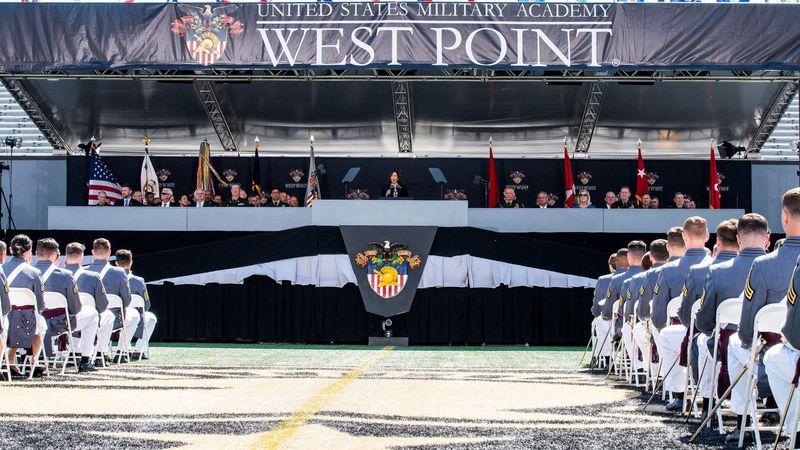West Point should end affirmative action in admissions, group tells US judge
2023.12.21 15:16

© Reuters. FILE PHOTO: U.S. Vice President Kamala Harris speaks during the 2023 graduation ceremony at the United States Military Academy (USMA), at Michie Stadium in West Point, New York, U.S., May 27, 2023. REUTERS/Eduardo Munoz/File Photo
By Nate Raymond
(Reuters) – The group behind the successful U.S. Supreme Court challenge to race-conscious college admissions policies urged a federal judge on Thursday to block the U.S. Military Academy at West Point from considering race when evaluating candidates to attend the elite military school.
A lawyer for Students for Fair Admissions, a non-profit founded by affirmative action foe Edward Blum, told U.S. District Judge Philip Halpern in White Plains, New York, that a West Point policy designed to boost diversity within its ranks amounted to unconstitutional discrimination.
The lawyer, Patrick Strawbridge, pointed to the June ruling by the U.S. Supreme Court’s 6-3 conservative majority that rejected policies long used by American colleges and universities to increase the number of Black, Hispanic and other minority students on U.S. campuses.
In invalidating admissions policies at Harvard University and the University of North Carolina, the Supreme Court did not address race in admissions at military academies, which Chief Justice John Roberts in a footnote said had “potentially distinct interests.”
Strawbridge said there was nothing special about the military academies compared to civilian universities that should legally allow them to give applicants of certain races a benefit in the admissions process over others, including white people.
“Racial discrimination is not made more palatable just because it wears a uniform,” Strawbridge said.
But Assistant U.S. Attorney Ellen Blain, arguing on behalf of Democratic President Joe Biden’s administration, countered that unlike a civilian university, West Point is training the next generation of Army officers who will lead soldiers into war.
She said the military deserved deference for its long-held assessment that establishing a racially and ethnically diverse officer corps is necessary to build combat-ready forces, an assessment rooted in a history of racial tensions in the military that has risked mission readiness.
“This is a national security imperative,” Blain said.
Halpern, an appointee of Republican former President Donald Trump, said he planned to rule “quickly” on SFFA’s request for a preliminary injunction, citing West Point’s Jan. 31 application deadline.
He at times said he was “struggling” with aspects of the group’s request, though he also questioned whether West Point could achieve diversity among its cadets in another way that does not involve considering race to fill certain seats.
“Why do we need it in the admissions process?” he said.
The hearing came a week after a different federal judge in Maryland rejected a similar request by Blum’s group to prevent the U.S. Naval Academy at Annapolis from considering race.
Blum’s group had sued both military academies this year with the goal of ending what was essentially an exemption for them tucked into the Supreme Court’s ruling on college admissions.
In court papers defending West Point’s consideration of race, the Justice Department said that although Black people make up 20.2% of the Army’s active duty enlisted personnel, only 11% of officers are Black.
Hispanic people constitute 18% of active personnel but only 9% of officers, the department said. White people by contrast constitute 51.7% of the Army active duty enlisted corps and 68% of its officers, the Justice Department said.








